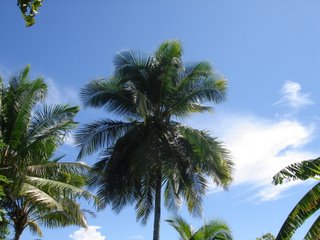 Together with rice, copra is one of Lianga's main agricultural products and the town is surrounded by hectares of land planted with the coconut trees from which it is produced.
Together with rice, copra is one of Lianga's main agricultural products and the town is surrounded by hectares of land planted with the coconut trees from which it is produced.In the past, these coconut farms used to belong to huge tracts belonging to a few wealthy landowners who, by virtue of their wealth and social standing, controlled the economy and politics of the area. But in many ways this is no longer true.
These once huge estates over time have been largely broken up and sold off to smaller landowners and farmers. The government's land reform program, although often halfhearted and slow, has also enabled a number of small farming families to own coconut land of their own. Many of them used to be merely tenants and virtual feudal serfs to absentee landlords but now they till these small parcels as their own.
But that is a fact that holds little, actual material value to these people. It may be their land but they are still chained and tied to it by what amounts to economic bondage or slavery. And their new masters are not the old landlords but the the economic interests that control the trading of copra and coconut oil in the national market. These are the entities that ensure that they are paid a mere pittance for their backbreaking work and who connive to keep them in perpetual debt and, therefore, under their economic control.
And the government is more than often the willing partner to this appalling exploitation. Billions of pesos accumulated as a result of the coconut levy imposed during the Marcos dictatorship have not been used to help the millions of coconut farmers whose toil and hard labor have merely served to lavishly line the pockets of those in the privileged few, both in government and outside it, who have used the money and proceeds from it to enrich themselves at the farmers' expense.
The government's neglect of the coconut industry is most glaring in the fact that even in the early years of the 21st century, small farmers in and around Lianga still grow coconut trees, harvest coconuts and make copra as their grandfathers did fifty or more years ago. Obsolete farming methods, the failure to introduce better and more disease resistant coconut tree varieties which produce more nuts per hectare than the traditional ones, and the lack of farmer education on modern and more efficient copra making technologies have all served to ensure that these farmers remain exploited and miserably poor.
Add to that the emergence of palm oil as a strong alternative to coconut oil in the world market and you have the ingredients for what may be looming disaster for those millions of families whose lives have been intertwined with the fate of the local coconut industry.
The coconut is often called the tree of life because its many components have a large number of important uses. It is indeed that for the many small coconut farmers who continue to depend on coconut trees for their livelihood and economic survival. But unless nothing changes, the future is going to be bleak for most of them.
Time for the country and this government to sit up and take notice. Before the coconut farmers get pissed off and go totally nuts.
No comments:
Post a Comment